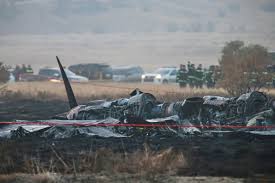NATO Military Plane Crashes in Georgia: What We Know

Introduction
The recent crash of a NATO military plane in Georgia has sparked widespread concern regarding military operations and safety protocols in the region. The incident highlights the complexities that arise when foreign military units engage in joint exercises and operations within potentially volatile areas. As NATO continues its commitment to collective defence, understanding the implications of such incidents is crucial for both military personnel and the general public.
The Incident
On October 25, 2023, a NATO military aircraft, a Lockheed Martin C-130 Hercules, crashed in a remote area near Tbilisi, the capital of Georgia. Eyewitness reports indicate that the plane encountered technical malfunctions shortly after takeoff, leading to a loss of control. Emergency response teams were deployed immediately, and preliminary reports suggest that all crew members have been accounted for, with a few sustaining minor injuries.
Official Responses
Following the crash, military officials from NATO, as well as local Georgian authorities, swiftly initiated an investigation to ascertain the cause of the incident. Major General John Smith, a NATO spokesperson, conveyed their condolences to the crew and reaffirmed the commitment to thorough investigations. He stated, “Safety is our top priority, and we will ensure that a full report is conducted to understand the circumstances leading to this unfortunate incident.”
Given the strategic importance of Georgia as a NATO partner, both the alliance and the Georgian government are keen to ensure that such incidents do not undermine public confidence in their military collaborations.
Implications for NATO Relations
This crash raises several questions about operational safety in regions where NATO forces are engaged. Georgia has been a significant participant in NATO operations, particularly in peacekeeping and security missions. The implications of this incident may lead to stricter safety protocols and operational reviews. Experts suggest that NATO may re-evaluate its training and operational measures to prevent future accidents while maintaining strong military alliances in Eastern Europe.
Conclusion
The crash of a NATO military plane in Georgia serves as a chilling reminder of the risks associated with military operations. As investigations continue, the focus on safety and operational integrity within NATO forces will likely intensify. Stakeholders will undoubtedly keep a close watch on the outcomes of these inquiries, which could shape military strategies and safety standards in the future. For both military personnel and the general public, these developments underscore the importance of maintaining vigilant oversight in defence operations.









